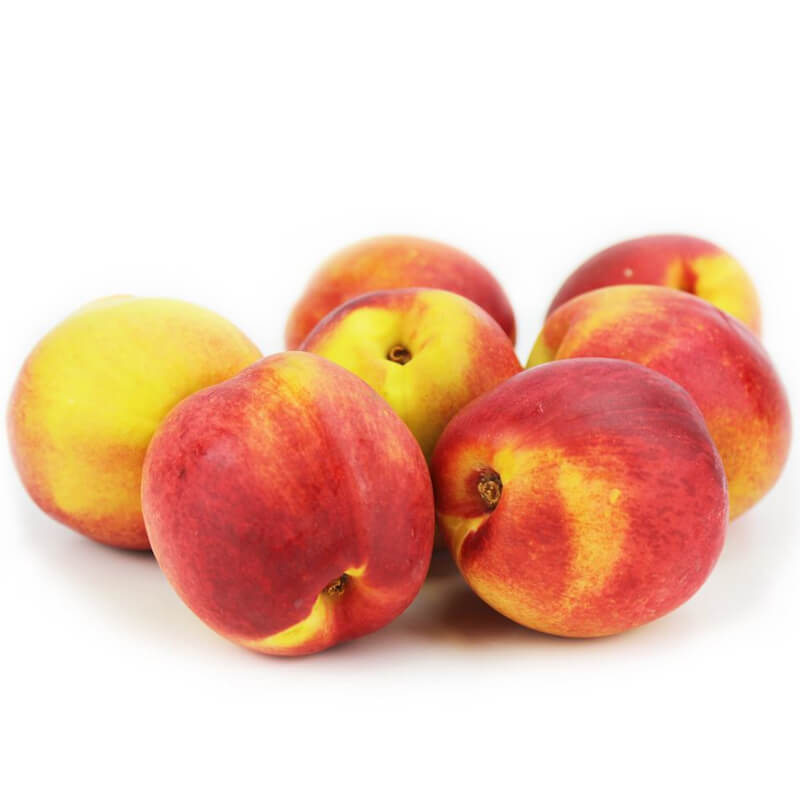Fresh ORGANIC nectarines (approx. 600 g)
- Regular price
- €5,39
- Regular price
-
- Sale price
- €5,39
- Unit price
- per
Couldn't load pickup availability
Description
x - a source of vitamins and minerals
- low in calories
- a healthy snack, a delicious addition to dessert, an excellent base for preserves
Nectarine (Prunus persica var. nucipersica) is a cultivar (actually a group of cultivars) of the common peach. It differs from the peach in having a thin, smooth, non-hairy skin and a firmer and juicier, sweeter flesh.
The origin of nectarines remained a mystery for a long time. It has been suggested that it was the result of a cross between a peach and a plum, and had inherited a smooth skin from the latter. However, genetic studies have shown that nectarines lack the characteristic moss due to the recessive gene responsible for this trait.
Associated with hot summer and holiday supplies, these fruits boast high nutritional value. at the same time low in calories. There are around 44 kcal in 100 g of nectarine, and it is also rich in vitamins A, E, K1, C, B1, B2, PP, B6, folic and pantothenic acid as well as iron, phosphorus, potassium, zinc, copper, manganese and calcium . Nectarines are particularly recommended for pregnant women, those wanting to lose weight - their glycemic index is only 35 and their fiber content is long-lasting - and for athletes.
Nectarines are a great snack to eat raw, but they can also be a delicious addition to desserts, pancakes, cakes, ice cream, salads, and even meat.
RECOMMENDED STORAGE CONDITIONS
RECOMMENDED STORAGE at 5 -10°C
similar products
- Regular price
- €5,39
- Regular price
-
- Sale price
- €5,39
- Unit price
- per
- Regular price
- €5,39
- Regular price
-
- Sale price
- €5,39
- Unit price
- per
- Regular price
- €5,39
- Regular price
-
- Sale price
- €5,39
- Unit price
- per
- Regular price
- €5,39
- Regular price
-
- Sale price
- €5,39
- Unit price
- per
- Regular price
- €5,39
- Regular price
-
- Sale price
- €5,39
- Unit price
- per
- Regular price
- €5,39
- Regular price
-
- Sale price
- €5,39
- Unit price
- per
- Regular price
- €5,39
- Regular price
-
- Sale price
- €5,39
- Unit price
- per
- Regular price
- €5,39
- Regular price
-
- Sale price
- €5,39
- Unit price
- per
- Regular price
- €5,39
- Regular price
-
- Sale price
- €5,39
- Unit price
- per
- Regular price
- €5,39
- Regular price
-
- Sale price
- €5,39
- Unit price
- per
Recently Viewed Products
- Regular price
- €5,39
- Regular price
-
- Sale price
- €5,39
- Unit price
- per
- Regular price
- €5,39
- Regular price
-
- Sale price
- €5,39
- Unit price
- per
- Regular price
- €5,39
- Regular price
-
- Sale price
- €5,39
- Unit price
- per
- Regular price
- €5,39
- Regular price
-
- Sale price
- €5,39
- Unit price
- per
- Regular price
- €5,39
- Regular price
-
- Sale price
- €5,39
- Unit price
- per
- Regular price
- €5,39
- Regular price
-
- Sale price
- €5,39
- Unit price
- per
- Regular price
- €5,39
- Regular price
-
- Sale price
- €5,39
- Unit price
- per
- Regular price
- €5,39
- Regular price
-
- Sale price
- €5,39
- Unit price
- per
- Regular price
- €5,39
- Regular price
-
- Sale price
- €5,39
- Unit price
- per
- Regular price
- €5,39
- Regular price
-
- Sale price
- €5,39
- Unit price
- per
- Choosing a selection results in a full page refresh.











